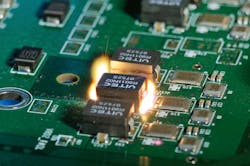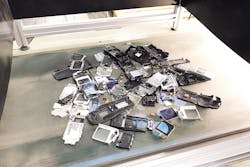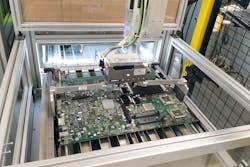Laser processing recovers valuable raw materials
A new laser recycling concept, “urban mining,” is focused on tantalum, neodymium, tungsten, cobalt, and gallium, found in virtually every modern electronic device. These metals are valuable due to their scarcity, their cost (in some cases is close to 250 Euros per kilogram), and the tremendous difficulty of recovering them from used electronic devices in a cost-effective way.
An EU project proposes to develop an automated method of recycling electronic devices by disassembling them and recovering the valuable raw materials they contain. Under the title of “Next generation urban mining – Automated disassembly, separation and recovery of valuable materials from electronic equipment,” dubbed ADIR, the project team has spent the last four years developing a sustainable recycling concept. Led by the Fraunhofer Institute for Laser Technology (Fraunhofer ILT; Aachen, Germany) and involving eight project partners from three countries, the ADIR project’s strategic goal is to reduce the EU’s dependency on natural resources, reduce the need for costly imports of raw materials, and demonstrate new technologies for inverse production.
The ADIR project researchers sorted several kilograms of components for recovery of valuable metals by disassembling around 1000 mobile phones and over 800 printed circuit boards (PCBs) from computers.The key term “urban mining” refers to the recovery of secondary raw materials from buildings, infrastructure, or products. Led by Prof. Reinhard Noll and Dr. Cord Fricke-Begemann from Fraunhofer ILT, together with partners in the ADIR project, they developed a concept for a piece-by-piece processing of PCBs from computers and obsolete mobile phones.
The project revolves around automated, flexible processes designed to disassemble electronic devices to selectively extract valuable component parts at the end of their useful life. The disassembly plant relies on an intelligent combination of laser technology, robotics, vision systems, and information technology. Lasers play one of the key roles by identifying what each component consists of and desoldering or cutting components out of the board in a fast, non-contact process. The patented procedure is an efficient means of recovering strategically important materials of high economic value on an industrial scale.The project team has already received very positive feedback from experts at numerous events. “We’ve seen a great deal of interest from experts,” says project manager Fricke-Begemann. “And this enthusiastic response has also inspired our industry partners.” These include the company Electrocycling GmbH (Goslar, Germany), which has been trialing the ADIR method in field tests since late 2018 and validating it for industrial use. In a series of field campaigns, the company used the ADIR demonstrator—consisting of seven interlinked machines—to show how the developed processes can be used to extract significant quantities of tiny capacitors from electronic devices in order to recover tantalum, a valuable mineral resource. This task was carried out by the company H.C. Starck Tantalum & Niobium GmbH (also in Goslar), which was also participating in the ADIR project.
Several kilograms of components, between 96% and 98% of the tantalum, were recovered from around 1000 mobile phones and over 800 large computer PCBs. This example showed that many of the most important materials contained in electronic devices can be extracted just as efficiently as the project team had hoped, creating a novel source of secondary raw material with a high content of reusable material—significantly higher than that of the tantalum ore concentrates offered by suppliers of virgin raw material.
The pre-competitive research project has now been completed, and the ADIR team’s demonstrator has confirmed the concept’s economic viability. There is still room for improvement, however—for example, by using smart automation concepts to speed up the dismantling processes for the housing of mobile phones to get access to the PCB, the battery, and magnetic components. The researchers’ initial experiences, collected in a database, can be used to train a recycling machine in processing new mobile phone models.
The project team has found an initial set of partners willing to put them into practice and continues to seek further candidates. The advantages of this new concept go well beyond a more efficient use of raw materials. It has the potential to reduce Germany’s dependence on shipments of raw materials from other regions by offering new opportunities to introduce inverse production technologies. These are required to establish closed material cycles for future sustainable economy.
For more information, please visit ilt.fraunhofer.de.


